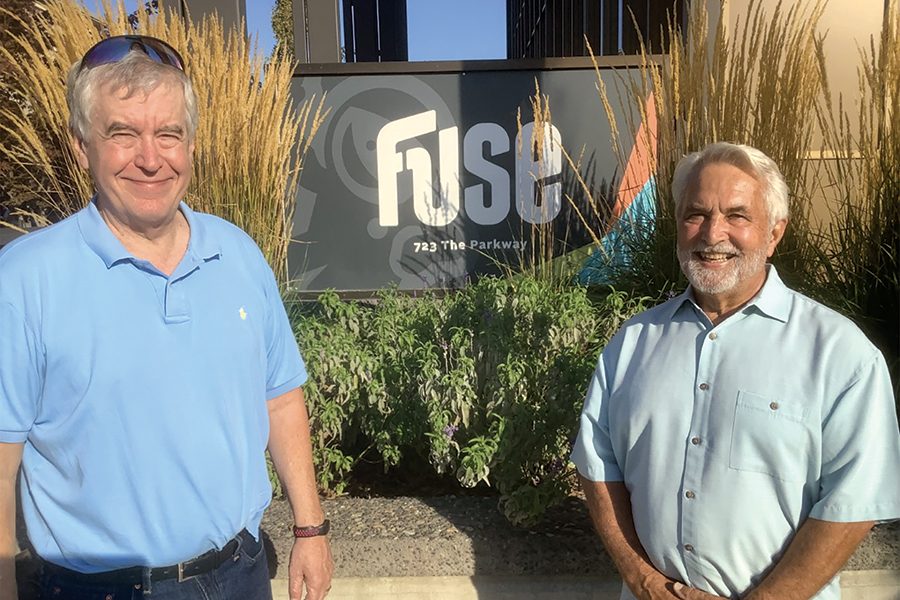
Home » Richland startup aims to fuel hydrogen-powered ecosystem
Richland startup aims to fuel hydrogen-powered ecosystem

December 16, 2022
Most people drive gasoline-powered vehicles. Others have moved over to electric vehicles.
But imagine a third option – driving a hydrogen-powered car or truck at a lower cost per mile.
That possibility is coming sooner than you think, thanks to a local startup company called STARS Technology Corporation.
The Richland-based company is deploying its first two prototype hydrogen generators – with the help of the Fuse Fund group in Richland, and scientists and engineers from the Pacific Northwest National Laboratory, and HiLine Engineering and Fabrication, a local high tech engineering company in Richland.
It’s something Bob Wegeng, STARS Technology’s president and chief technology officer, has worked toward for over 25 years.
The commercial demonstration, led by Southern California Gas Company (SoCalGas), will place two prototype STARS-165 Clean Hydrogen Generators – called Beta 1 and Beta 2 – at SunLine Transit Agency’s hydrogen-fueling station in Thousand Palms, California.
The demonstration project, called H2 SilverSTARS, will produce clean hydrogen to fuel SunLine’s 17 buses.
Eventually, a Beta 3 prototype is intended to be the mass-produceable commercial model.
Marty Conger, managing partner of Fuse Advisors LLC and the Fuse Fund group, were impressed with STARS’ new technology, and the potential opportunity being created by a worldwide transition from fossil energy to clean hydrogen.
The Fuse Fund group of investors, who have a mission to help local startup companies, made a significant investment in STARS.
“The prototype has been working since December, pumping out hydrogen,” Conger said.
The first of two generators was delivered in September to SoCalGas,, which is the nation’s largest natural gas utility.
SoCalGas is managing the SunLine site preparation and expects to have the generator producing hydrogen in January.
Conger and Fuse aren’t the only ones impressed with the project.
STARS was honored recently at the Rice Energy Technology Venture Forum as a top-10 energy technology company out of 100 startups at the forum.
The company also received the Richland Rotary Club’s Entrepreneurial Award in November.
What is STARS?
STARS was founded in 2016 to commercialize a portfolio of chemical processes from research and development at PNNL.
The startup is helping to create a future where low-cost, renewable hydrogen powers transportation, industry and more.
STARS has an exclusive license to technology developed at PNNL.
Wegeng, who left PNNL to take on the challenge of bringing the new chemical process chip technology to industry, is leading a group of five local individuals who are commercializing the technology.
“Early experiments showed the potential to develop a new class of devices – ‘chemical process chips’ – that intensify chemical reactions,” Wegeng said. “These successes helped to raise more funding opportunities to continue the development.”
Over the years, many specific applications and new components were developed. In all, over $50 million was invested in the PNNL research.
In 2016, the U.S. Department of Energy encouraged technology developers to take their inventions to market, and STARS was formed.
Today, STARS’ assets include a local investment, a dedicated team of individuals working toward a common goal, and the exclusive right to intellectual property related to chemical process chips developed at PNNL.
Those patents provide both ongoing and future opportunities to develop chemical process chips for new applications beyond hydrogen generation.
“There are many more applications for our technology, Wegeng said. “Chemical reactors can be developed to produce ammonia, methanol, and other chemical products using the chemical processing chips.”
Christina Lomasney, director of commercialization at PNNL, is impressed with STARS’ work.
“We applaud the work by Bob Wegeng and his team at STARS in translating cutting-edge, taxpayer-funded, PNNL research into economic impact,” Lomasney said in a press release. “The STARS team (members) are pioneers in the realization of a viable clean hydrogen economy. It is gratifying to see the local venture ecosystem – led by Fuse Fund – bringing support to our home-grown entrepreneurs and their visions for a better future.”
Wegeng credits the support of PNNL; HiLine Engineering and Fabrication, and company owner Troy Stokes and his team of engineers; Concept Systems Engineering of Kennewick; California’s Barr Engineering; Oregon State University; SoCalGas; and SunLine.
The coming age of hydrogen
According to STARS, hydrogen has been recognized by many as the most viable solution to large-scale decarbonization of the heavy-lift transportation industry.
Wegeng believes this is the hydrogen decade, as the transition from fossil energy to clean hydrogen energy begins.
“The market for hydrogen is expected to grow exponentially over the next few decades, driven by the wide adoption of fuel cells in a new class of zero-emission vehicles, or ZEVs,” according to the company.
It took Wegeng’s group years to get to this point.
“Finding the right solution sometimes involves finding what doesn’t work,” Wegeng said. “There have been many pivots to get to where we are today.”
But it’s led the company to where Wegeng feels STARS is introducing the right technology at the right time. He said the momentum is growing for developing the clean hydrogen infrastructure that will support fuel cell deployment.
The federal government recently passed the Bipartisan Infrastructure Bill which included $8 billion for regional hydrogen hubs (“We’re involved with helping develop the proposal to create a regional hub in the Pacific Northwest,” said Wegeng), and the Inflation Reduction Act, which carried about $370 billion in subsidies and credits for clean energy investment in the United States.
In California, what STARS is doing will meet the new Federal Clean Hydrogen Standard for fueling SunLine’s fuel cell buses.
Here’s how it works
Fuel cells produce electricity by a chemical reaction that converts hydrogen and oxygen (from air) to water.
The lower weight of fuel cells and compressed hydrogen make fuel cells an ideal alternative to batteries, where the weight and recharging time of batteries can be problematic.
Fuel cells with compressed hydrogen weigh a fraction of a battery pack with the same energy storage capacity, and they can be refueled in minutes (comparable to gasoline-powered vehicles).
What Wegeng and his staff believe is that “as the nation transitions to electric propulsion, it’s expected that at least 30% of the transportation sector will utilize fuel cells for electricity.”
That 30% could include cars that routinely drive long distances, delivery vehicles, long-haul trucking, mass transit, and even ships and aircraft.
The STARS hydrogen generator units that turn methane and water into hydrogen is done in a process called steam-methane reforming.
Heat for the reaction is maintained using electrical induction heaters.
When the renewable natural gas is used, the hydrogen produced has a negative carbon intensity.
The additively-manufactured chemical process chips are made from highly efficient microchannel devices.
With mass production, the compact and modular units can be placed on the existing natural gas grid to produce onsite, affordable hydrogen at filling stations or industrial locations that will compete with gasoline.
Fuse Fund steps in
Fuse’s mission is to help grow the entrepreneurial ecosystem in the Tri-Cities, providing resources to support the success of local entrepreneurs and startups.
In late August, Fuse Fund, made up of local community-minded investors based in the Tri-Cities, announced a financing round for the project of $150,000.
Fuse worked with other local investors to raise another $350,000 for a total of $500,000.
“It’s a community story,” Wegeng said. “The investment helps us get across the finish line for the H2 SilverSTARS demonstration project.”
The Fuse Fund group had been working with STARS managers for the last two years to get the company investment ready.
“Bob pitched to us that he needed $300,000,” Conger said. “I said, ‘Let’s make it $500,000 because you’re always going to have surprises.’ The STARS technology reduces production costs and uses only 20% of the power required by electrolyzes to make its hydrogen. Bob’s story resonated with our investors. One individual wanted in for $100,000.”
STARS is just one of many investments by Fuse.
In September, Fuse announced that its local investors had achieved total funding commitments to local companies totaling $2.025 million.
Fuse Funds, as of September, has $800,000 either invested or pending in five startups that did make it through the group’s evaluation and funding process.
“The important point is that these investments are being made to benefit startups operating in and around the Tri-Cities,” Conger said. “Nobody in Fuse Funds is paid a salary. They’re volunteering their time for the Tri-Cities.”
And everyone is excited to see the STARS commercial demonstration get started, especially Wegeng.
“I am impatient,” he said. “I’ve been waiting 25 years for this.”
Stars Technology Corporation: starsh2.com.
Fuse Fund: fuse.fund.
Energy
KEYWORDS december 2022




